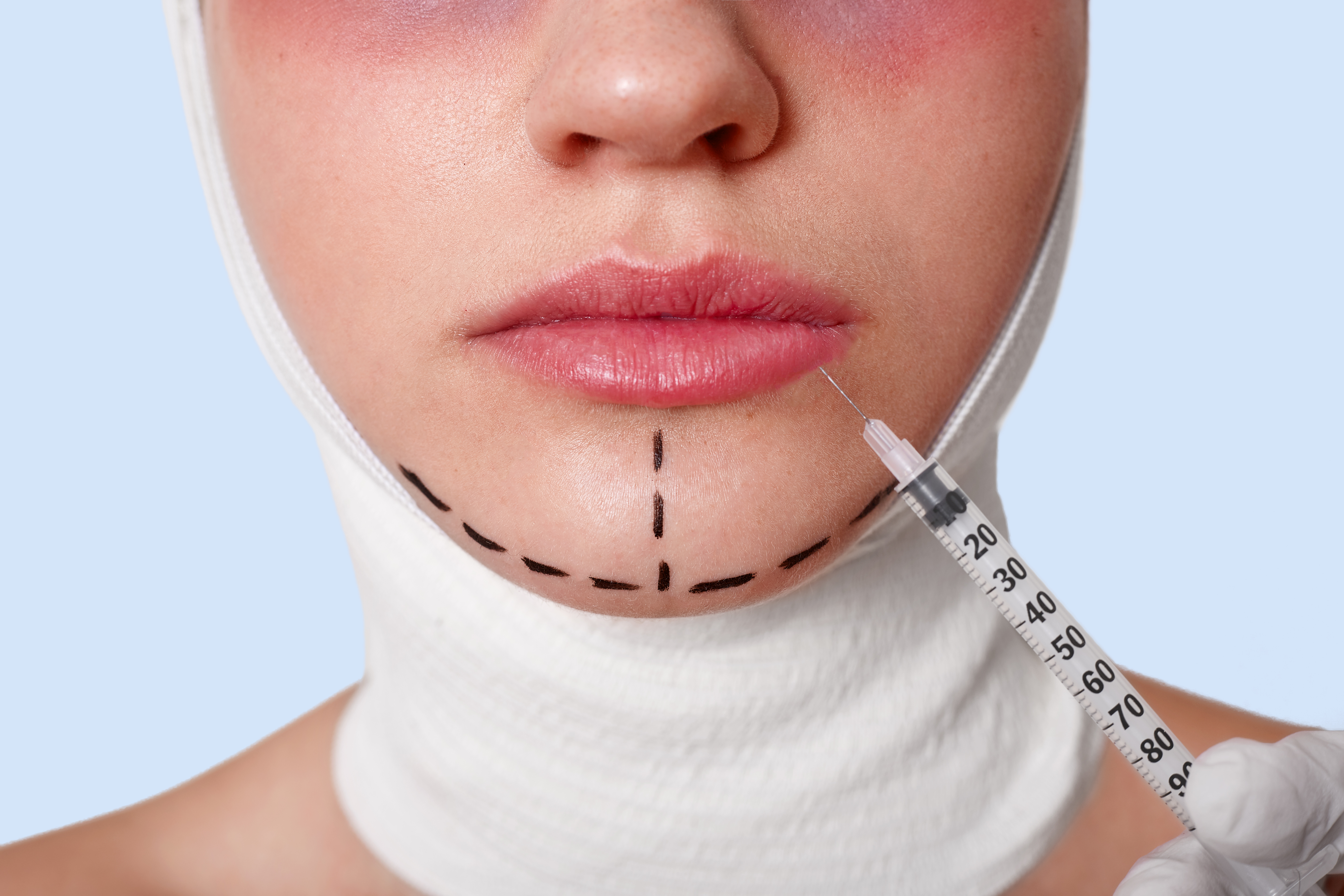Jaw Correction Surgery
Now Its Time For You Try Our Facial Care & Beauty Treatment

Genioplasty ( Chin Correction Surgery )
repositions the chin bone or places an implant through this incision
What is Jaw Correction Surgery ?
Jaw correction surgery, which is worldwide known as orthodontic surgery, is a surgery performed on the bones of the jaws to change their position and size. It involves repositioning all or part of the upper or lower jaw or chin in alignment. Sometimes, the bone may need to be added, reduced, or reshaped. When the jaws are moved forward or backward, up or down, or rotated, the soft tissue in the chin, cheeks, lips, and tip of the nose move accordingly. Therefore, once the jaws are correctly positioned, the facial appearance changes dramatically.
Mostly patients
This results in a facial profile that is more pleasing or in fact even more beautiful and above all the functional capabilities increases. These surgeries are done by Oral or maxillofacial surgeons and always needed pre and post orthodontic specialist for there expertise in getting a good occlusion for cosmetic and functional dentition.
Who is a maxillofacial surgeon?
Oral and maxillofacial surgery deals with major and minor surgeries of the oral and facial regions. It is a specialty of dentistry that deals with all facial procedures, whether cosmetic or functional. Oral and maxillofacial surgeons train for three years (my name is Tejasvini) to obtain their masters in the field. These surgeons further their specialization in oral cancer surgery, plastic surgery, rhinoplasty, and emergency facial fractures along with rehabilitation as well. This specialty comprises many procedures.
ORTHOGNATHIC SURGERY (JAW SURGERY) | Kreative Aesthetics
This type of jaw surgery, also known as orthognathic surgery, aims to improve the positioning of your jaws when they fail to line up correctly (this is done using comprehensive facial X-rays and computer video imaging tools). As your jaws are surgically shifted into their new and improved positioning, to correct your jaw problems, your orthodontist will collaborate with one of our Montreal-based maxillofacial surgeons to align and level your teeth.
Individuals who have bite problems and jaw misalignments will benefit the most from orthognathic surgery. Bite and jaw misalignments can cause a host of complications, including trouble speaking, eating, and even low self-esteem. Other possible issues that should be evaluated by an oral surgeon include:
- TMJ pain / Jaw and neck pain
- Facial imbalances
- Open or underbites
- Breathing complications
- Gummy smile, which occurs when there is disproportionate exposure of the gums when smiling.
Such issues can occur from birth or from environmental sources, such as an injury. Your oral surgeon will examine your mouth and facial area to create a treatment plan that is best for you. This involves the use of comprehensive facial x-rays and computer video imaging to illustrate how your bite will look after surgery. This will also allow you to understand the treatment process better.
- Orthognathic Surgery (Top) Click here for high-res version
- Orthognathic Surgery (Bottom) Click here for high-res version
Planning for your corrective jaw surgery
Your surgeon will work together with your orthodontist to determine the best position for your teeth and jaw. Aspects include:
- Your orthodontist will evaluate the positioning of your teeth and how braces will move them in relation to the position of your jaw after the oral surgery.
- The horizontal and vertical proportions of your face will be methodically analyzed. Planning for coinciding positioning of teeth and jaw bones is essential and helps to ensure your teeth stay healthy whilst also ensuring that facial features remain harmonious.
- You will be fitted with braces, which you will have to wear for 6 to 18 months. The duration will depend on how long it takes to properly shift your teeth into their ideal positioning, before the jaw surgery.
- Your oral surgeon will determine the best way to align your jaw to improve its functionality. Your medical history and prior surgeries will be reviewed to understand how your condition arose. You should mention any intentions to undergo future dental surgeries to your surgeon. A full examination of your nose, head, neck, eyes, mouth, shoulders, and temporomandibular joint (jaw point) will be performed. X-rays or photographs may also be taken.
- Using 3-D Models and cutting edge computer-assisted planning tools to outline your procedure and give you a preview of your projected final outcome.
Preparing for your oral surgery
- Most of our past patients required that their wisdom teeth be extracted, preferably at 6-12 months before their jaw surgery – This is to prevent future complications, brought on by newly-erupting wisdom teeth.
- Your Montreal-based oral surgeon will monitor your progress and will begin planning for your oral surgical procedure starting at approximately 6 months before your scheduled surgery date.
- Your surgeon may carry out one or several “simulated” surgeries on casts of your mouth to prepare for your procedure.
- Your surgeon will review the exact nature of your procedure, and possible side effects, risks and benefits of your surgery.
How jaw surgery is performed
Jaw surgery is carried out in a hospital setting. You will be provided with general anesthesia to ensure you don’t feel pain. Your surgeon will use specialized instruments to make bony cuts into your jaw—almost exclusively inside your mouth—which will allow your jaw to be moved in the necessary direction without causing visible scarring. This involves moving your upper or lower jaw forward or backward; however, the upper jaw may also need to be adjusted width-wise.
If a patient has excessive gum exposure, the underlying bone may be removed to allow the oral surgeon to reposition the jaw upward. Once the jaw is positioned properly, the upper and lower jaws are temporarily wired shut, while the bony cuts are repaired using minuscule bone plates and screws. Modern dental techniques mean patients no longer have to have their jaws wired shut for 4-6 weeks, as was once customary upon the completion of such oral surgeries. Incisions are then also carefully sutured. They are apt to heal quickly and have the added benefit of being concealed inside the patient’s mouth.
Potential complications resulting from jaw surgery will be discussed during a one-on-one conversation with our oral surgeons – during which we emphasize the importance of having a spouse or the patient’s parents present.
Recovery Period –Jaw Surgery | Kreative Aesthetics Surgery
When you wake up from surgery, you may feel groggy and experience some swelling and bruising in your facial area. Your mouth may feel numb, and your bite may not feel the same. This is normal and to be expected; however, the effects are temporary. You will be given pain medication to minimize discomfort. You must maintain good oral hygiene to keep the treated areas clean and free from infection.
As soon as you get home, you should:
- Rinse your mouth using warm salt water (1 teaspoon with 1 glass of water).
- Gently clean your teeth with a small toothbrush in order to remove food debris
- Rinse with salt water again. You may add mouthwash to the saltwater mix 2 weeks after your surgery.
- A “Water Pik may be used to develop your oral hygiene
Also, be sure to:
- Walk around somewhat frequently to promote circulation
- Drink plenty of liquids
- Eat a non-chew diet, which includes eating soft foods, prepared in a blender
- Your oral surgeon may also recommend physical therapy to help you learn facial exercises that will promote jaw movement and quicken your recovery time
- Expect to miss school or work for approximately 2 weeks following surgery.
- You should be able to resume your normal activities within 2 months of your surgery.
Your surgeon will give you detailed care instructions for your mouth. Follow-up appointments with your surgeon and orthodontists will be necessary to ensure your mouth is healing properly. In fact, the entire process can take two or more years, so you must consider all aspects before deciding whether or not jaw surgery is right for you.
If you have any questions, please contact Kreative Aesthetic Surgery today.
As soon as you get home you should:
- Rinse your mouth using warm saltwater (1 teaspoon with 1 glass of water).
- Gently clean your teeth with a small tooth brush, in order to remove food debris
- Rinse with salt water again. You may add mouthwash to the salt water mix 2 weeks after your surgery.
- A “Water Pik”may be used to develop your oral hygiene
Also be sure to:
- Walk around somewhat frequently to promote circulation
- Drink plenty of liquids
- Eat a non-chew diet, which includes eating soft foods, prepared in a blender
- Your oral surgeon may also recommend physical therapy to help you learn facial exercises that will promote jaw movement and quicken your recovery time
- Expect to miss school or work for approximately 2 weeks following surgery.
- You should be able to resume your normal activities within 2 months of your surgery.
Your surgeon will give you detailed care instructions for your mouth. Follow-up appointments with your surgeon and orthodontists will be necessary to ensure your mouth is healing properly. In fact, the entire process can take two or more years, so you must consider all aspects before deciding whether or not jaw surgery is right for you.
If you have any questions, please contact Seaforth Oral Surgery today.
What to Expect
- Corrective jaw surgery is a significant intervention requiring many months of preparation.
- The surgery is performed in the hospital and can last between one to four hours.
- Hospital stays of one to three days are normal.
- Braces are maintained during surgery and may need to be removed six to twelve months after surgery.
- The greatest impact of orthognathic surgery is the recovery phase.
- Patients typically may be off work/school from two weeks to one month after surgery.
- Return to normal chewing function may take 2 months and full function may take one year.
- Our goal is to ensure you are well taken care of during and after surgery.
- Weekly appointments are required for up to two months after surgery

Lets Get Appointment Of Our Treatments
Don’t wait too long; make an appointment before it’s too late…





